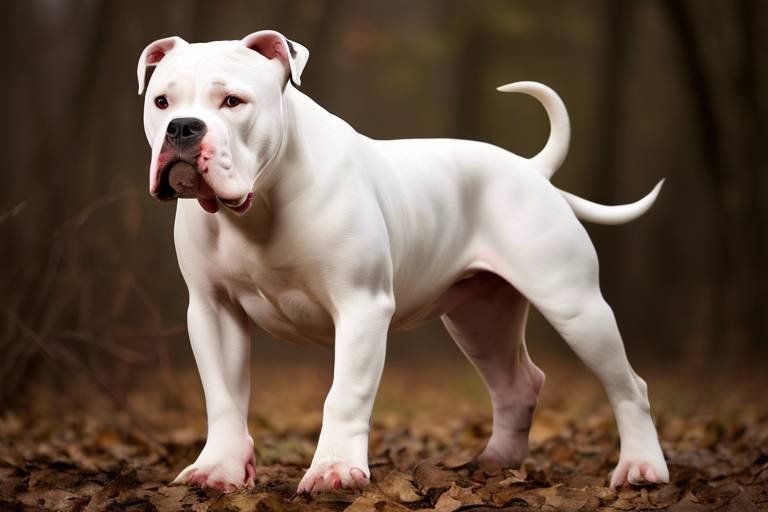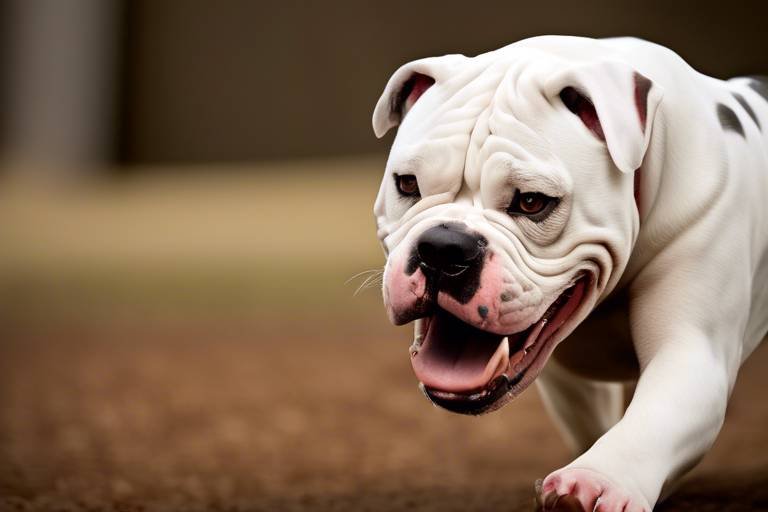A Guide to the Most Popular Exotic Dog Breeds
This article explores various exotic dog breeds, their unique characteristics, care requirements, and suitability for different lifestyles, helping potential dog owners make informed decisions about their next furry companion.
Exotic dog breeds often come with unique traits and histories that make them stand out from the more common breeds we see every day. But what exactly defines an exotic breed? These dogs typically hail from distant lands and have characteristics that are not only visually striking but also culturally significant. For instance, many exotic breeds have been shaped by their environments and purposes, whether it’s herding, hunting, or companionship. This rich background is what attracts dog enthusiasts around the globe, as they seek to connect with a breed that carries a story and a legacy.
Now, let’s dive into some of the most popular exotic dog breeds that have captured the hearts of many. Each of these breeds brings something unique to the table, from their origins to their physical characteristics and temperaments. Here are a few standout breeds:
The Shiba Inu, known for its fox-like appearance, is a spirited breed from Japan. This breed is not only cute but also possesses a strong personality that can be both charming and challenging. With a playful demeanor and a deep-rooted sense of independence, the Shiba Inu is often described as a cat-like dog. They require regular grooming to maintain their beautiful double coat and thrive in active households. Families with older children may find the Shiba Inu to be a perfect fit, as they can be quite affectionate yet require boundaries.
Often referred to as the barkless dog, the Basenji is an ancient breed from Africa known for its unique vocalization—a sound that resembles a yodel rather than a bark. This breed has a rich history as a hunting dog, and their keen instincts make them excellent companions for active individuals. However, potential owners should be aware that Basenjis can be quite stubborn and may present training challenges. Their high energy levels mean they need plenty of exercise to keep them happy and healthy.
Caring for exotic dog breeds requires a deeper understanding of their specific needs. These dogs often have unique dietary requirements, exercise needs, and health considerations. Proper care is essential for ensuring they lead healthy, fulfilling lives. Let's break it down further:
Proper nutrition is crucial for the health of exotic breeds. Each breed may have its own dietary needs, so it’s important to consult with a veterinarian to create a tailored feeding plan. Generally, a high-quality dog food that meets their specific age, size, and activity level is recommended. Here are some key points to consider:
- Choose a reputable brand that offers breed-specific formulas.
- Monitor portion sizes to prevent obesity.
- Include a mix of proteins, fats, and carbohydrates for balanced nutrition.
Exotic breeds often have high energy levels and unique training needs. Regular exercise is not just a suggestion; it’s a necessity. Daily walks, playtime, and mental stimulation are essential to keep these dogs engaged and happy. Training should be consistent and positive, utilizing rewards to encourage good behavior. Remember, patience is key when working with some of the more stubborn breeds!
Like all breeds, exotic dogs can be prone to specific health issues. Some common ailments associated with popular exotic breeds include hip dysplasia, eye problems, and skin conditions. Regular veterinary check-ups and a proactive approach to health care can help mitigate these risks. It’s important for potential owners to be aware of these issues and consider them when choosing a breed.
Adopting an exotic dog can be a rewarding experience, but it’s essential to do your homework. The adoption process may vary, so understanding what to expect can help ease the transition. Before bringing a new dog home, consider the following:
- Research the breed’s specific needs and temperament.
- Find reputable breeders or rescue organizations.
- Prepare your home for the new arrival.
In conclusion, exotic dog breeds offer diverse and fascinating companions that can enrich our lives. Each breed comes with its own set of characteristics and needs, making it essential for potential owners to consider their lifestyle before making a decision. Whether you’re drawn to the spirited Shiba Inu or the unique Basenji, there’s an exotic breed out there for everyone. Embrace the journey of finding your next furry friend!
Q: What is the most exotic dog breed?
A: While "exotic" is subjective, breeds like the Shiba Inu and Basenji are often considered exotic due to their unique traits and origins.
Q: Are exotic breeds good for families?
A: Many exotic breeds can be great family pets, but it’s crucial to consider their energy levels and temperament.
Q: How do I choose the right exotic breed for my lifestyle?
A: Assess your daily routine, activity level, and the time you can dedicate to training and care before selecting a breed.

[Understanding Exotic Dog Breeds]
When we talk about exotic dog breeds, we're diving into a world filled with unique traits, captivating histories, and often, a sprinkle of mystery. But what exactly defines an exotic breed? Generally, these are breeds that are less common and often originate from specific geographical regions, making them stand out in a sea of more familiar breeds. Think of them as the rare gems of the canine world, each with its own story to tell.
These breeds attract dog enthusiasts for a variety of reasons. For one, their distinctive appearances can be utterly mesmerizing. Imagine a dog that looks like a fox or one that resembles a tiny wolf! Beyond looks, many exotic breeds come with fascinating cultural significance and histories that date back centuries. For instance, the Shiba Inu hails from Japan, where it has been cherished for its loyalty and spirited personality. Understanding these origins can deepen the bond between the owner and their furry friend.
Moreover, exotic breeds often have unique personalities that can be both charming and challenging. They may exhibit traits that are not commonly found in more mainstream breeds, such as a particular level of independence or specific social needs. This can make them particularly appealing to dog lovers who are looking for a companion that is a bit off the beaten path. However, it's essential to remember that with these unique traits come specific care requirements.
For potential dog owners, understanding the nuances of these exotic breeds is crucial. It’s not just about aesthetics; it’s about finding a pet that fits seamlessly into your lifestyle. Whether you live in a bustling city or a tranquil countryside, there’s likely an exotic breed that aligns perfectly with your living situation. So, as you embark on this journey of discovering exotic dog breeds, keep in mind the following key points:
- History: Each breed has its own rich background that can enhance your understanding and appreciation of them.
- Temperament: Knowing the behavioral traits can help you decide if a particular breed is right for your family.
- Care Needs: Exotic breeds may require specialized grooming, training, and health care.
As you explore the world of exotic dog breeds, remember that they are not just pets; they are companions that bring joy, love, and sometimes a little chaos into our lives. Understanding their unique characteristics will not only help you choose the right breed but will also pave the way for a fulfilling relationship with your new furry family member.

[Top Exotic Dog Breeds]
When it comes to choosing a dog, many people are drawn to the allure of exotic breeds. These unique canines not only stand out in appearance but also boast distinct personalities and histories. In this section, we will explore some of the most popular exotic dog breeds, diving into their origins, physical characteristics, and temperaments. Whether you're looking for a playful companion or a loyal guardian, there's an exotic breed out there that could be the perfect fit for you!
First on our list is the Shiba Inu, a breed that hails from Japan and is often described as a small fox in a dog’s body. With its curled tail and alert expression, the Shiba Inu is undeniably charming. This spirited breed is known for its independence and strong-willed nature, making it both a delightful and challenging companion. Shiba Inus are typically clean dogs, often likened to cats in their grooming habits, but they do require regular brushing to keep their coat in top condition. Families with older children may find this breed a great addition, as they are generally good-natured but can be reserved around strangers.
Next up is the Basenji, often referred to as the "barkless dog." Originating from Central Africa, the Basenji is known for its unique yodel-like sound, which is a result of its tightly curled larynx. This ancient breed was historically used for hunting, and as such, they possess strong instincts and a high energy level. Basenjis are intelligent and can be quite stubborn, which presents certain challenges when it comes to training. However, with patience and consistency, they can learn commands and tricks. Their short coat requires minimal grooming, making them relatively low-maintenance, but they do need regular exercise to keep them happy and healthy.
Another exotic breed that captures attention is the Chow Chow. Known for their lion-like mane and distinctive blue-black tongue, Chow Chows are both beautiful and unique. Originating from China, these dogs have a strong guarding instinct and can be quite aloof with strangers. They are loyal to their families but require early socialization to ensure they are well-adjusted. Chow Chows have a thick double coat that demands regular grooming to prevent matting and to manage shedding. Their dignified demeanor and independent spirit make them a fascinating breed for those who appreciate a dog with character.
The Akita is another exotic breed that captures hearts with its majestic presence. With roots in Japan, Akitas are known for their loyalty and protective instincts. They are large, powerful dogs with a noble appearance and a thick, plush coat that requires regular grooming. Akitas are devoted to their families but can be reserved around strangers, making them excellent watchdogs. However, they require early socialization and consistent training to ensure they develop into well-mannered companions. Their playful yet dignified nature makes them a wonderful addition to active households.
Last but not least, we have the Tibetan Mastiff. This breed is not just exotic in appearance but also in temperament. With a thick coat and imposing stature, Tibetan Mastiffs were originally bred to protect livestock in the Himalayas. They are known for their strong-willed nature and can be quite independent. While they are loyal and protective of their families, they require experienced owners who can provide firm and consistent training. Their majestic presence and deep bark can be intimidating, but with the right training and socialization, they can be gentle giants.
In summary, exotic dog breeds like the Shiba Inu, Basenji, Chow Chow, Akita, and Tibetan Mastiff each bring their own unique flair to the world of canine companions. It's essential for potential owners to consider their lifestyle and preferences when choosing a breed. Each of these dogs has specific needs and characteristics that can greatly influence the harmony of your home. So, which exotic breed resonates with you?
- What makes a dog breed exotic?
Exotic dog breeds are often defined by their unique physical characteristics, distinct temperaments, and origins that differ from the more common breeds. They may also have specific cultural or historical significance. - Are exotic dog breeds suitable for families?
Many exotic breeds can be great family pets, but it depends on the individual dog's temperament and the family's lifestyle. It's crucial to research each breed's characteristics and needs. - How much exercise do exotic breeds need?
Most exotic breeds have high energy levels and require regular exercise. Daily walks, playtime, and mental stimulation are essential to keep them happy and healthy. - What are common health issues in exotic breeds?
Exotic breeds can be prone to specific health issues, often related to their unique physical traits. Regular vet check-ups and a healthy diet can help mitigate these risks.
[The Shiba Inu]
The Shiba Inu, a breed that captures hearts with its adorable fox-like appearance, is truly a gem from Japan. Known for its spirited personality and striking looks, the Shiba Inu stands out in the world of exotic dog breeds. With its compact size and agile build, this breed is not just a pretty face; it is also filled with energy and curiosity. Imagine a tiny whirlwind of fur and enthusiasm, always ready to explore the world around it!
One of the most captivating traits of the Shiba Inu is its independent nature. This dog is often described as having a cat-like demeanor, which means it can be quite aloof and may not always seek constant affection from its owners. However, don’t let this fool you! When they do decide to show affection, it’s a heartwarming experience that will leave you grinning from ear to ear. Their loyalty is unwavering, making them excellent companions for those who respect their space and independence.
When considering a Shiba Inu, it’s essential to understand their grooming needs. Their double coat, consisting of a soft undercoat and a stiff outer coat, requires regular brushing to keep it healthy and free from mats. During shedding seasons, which occur twice a year, you might find yourself with a mini-fur tornado in your home! To keep your Shiba Inu looking its best, aim for a grooming routine that includes:
- Weekly brushing to minimize shedding
- Regular baths to maintain coat cleanliness
- Routine nail trimming to keep their paws healthy
In terms of family suitability, the Shiba Inu can thrive in various environments, from apartments to spacious homes, as long as they receive adequate exercise and mental stimulation. They are generally good with children, but like all dogs, early socialization is crucial to ensure they grow up to be well-rounded pets. Think of them as the quirky uncle at family gatherings—sometimes a bit unpredictable but always entertaining!
In summary, the Shiba Inu is a breed that combines beauty, personality, and independence. They require owners who appreciate their unique traits and are willing to commit to their grooming and exercise needs. If you’re looking for a dog that is both adorable and full of character, the Shiba Inu might just be the perfect match for you!
Here are some common questions potential Shiba Inu owners often have:
- Are Shiba Inus good for first-time dog owners? While they can be independent and sometimes stubborn, with proper training and socialization, they can be a great choice for first-time owners.
- How much exercise do Shiba Inus need? Shiba Inus require daily exercise, ideally around 30 to 60 minutes, to keep them happy and healthy.
- Do Shiba Inus bark a lot? They are known to be relatively quiet, but they can be vocal when they want to communicate, especially if they sense something unusual.
[The Basenji]
The Basenji, often dubbed the barkless dog, hails from the heart of Africa and brings with it a rich tapestry of history and charm. This breed is not just a pet; it’s a conversation starter! With its unique yodel-like sound, known as a "barroo," the Basenji communicates in a way that’s both intriguing and endearing. Imagine having a dog that doesn’t bark but still manages to express its feelings—how cool is that?
With a sleek, athletic build and a face that can melt hearts, the Basenji is truly a sight to behold. They typically stand between 16 to 17 inches tall and weigh around 24 to 26 pounds. Their short, fine coat comes in a variety of colors, including red, black, and brindle, often with white markings that add to their distinctive look. But it’s not just their appearance that makes them special; it’s their personality!
Basenjis are known for their independent and intelligent nature. They are curious explorers, always eager to sniff out new adventures. However, this independence can sometimes translate into stubbornness during training. Owners often find themselves in a tug-of-war between wanting to teach their Basenji new tricks and the dog's innate desire to do things its own way. Patience and consistency are key when it comes to training these clever canines.
When it comes to family life, the Basenji can be a wonderful companion. They are generally good with children and can form strong bonds with their human families. However, their high energy levels mean that they thrive in active households where they can expend their pent-up energy through play and exercise. Regular walks, playtime, and mental stimulation are essential to keep a Basenji happy and healthy.
One of the most fascinating aspects of owning a Basenji is their unique grooming needs. Their short coat requires minimal grooming, which is a blessing for busy pet owners. A quick brush once a week is typically enough to keep their coat shiny and free from loose hair. However, it’s important to keep an eye on their ears and teeth, as Basenjis can be prone to dental issues and ear infections if not properly cared for.
In summary, the Basenji is not just another dog; it’s a unique breed that brings joy, laughter, and a hint of mischief into the home. If you’re looking for a dog with personality, charm, and a touch of the exotic, the Basenji might just be your perfect match!
- Do Basenjis bark? No, Basenjis are known as barkless dogs, and they communicate using a unique yodel-like sound.
- Are Basenjis good with children? Yes, they are generally good with children and can form strong bonds with families.
- How much exercise do Basenjis need? Basenjis require regular exercise, including daily walks and playtime, to keep them happy and healthy.
- Do Basenjis shed a lot? No, they have a short coat that requires minimal grooming and sheds less than many other breeds.
This article explores various exotic dog breeds, their unique characteristics, care requirements, and suitability for different lifestyles, helping potential dog owners make informed decisions about their next furry companion.
Exotic dog breeds often come with unique traits and histories. This section delves into what defines an exotic breed and why they attract dog enthusiasts around the world.
Discover the most popular exotic dog breeds, including their origins, physical characteristics, and temperament. This section highlights breeds that stand out for their uniqueness and appeal.
The Shiba Inu, known for its fox-like appearance, is a spirited breed from Japan. This section covers its personality traits, grooming needs, and suitability for families.
Often referred to as the barkless dog, the Basenji is an ancient breed from Africa. This unique title comes from the fact that these dogs do not bark like traditional breeds. Instead, they produce a distinctive sound called a "barroo," which is more akin to a yodel. This characteristic makes them particularly fascinating for dog lovers. Basenjis are known for their keen hunting instincts, high energy levels, and independent nature. Their origins trace back to the Congo, where they were used for hunting small game. Their sleek, athletic build and short coat make them not only beautiful but also relatively low-maintenance in terms of grooming. However, their spirited personality can lead to training challenges, as they are known to be quite stubborn.
Caring for exotic dog breeds requires understanding their specific needs. This section provides insights into diet, exercise, and health considerations unique to these breeds.
Proper nutrition is crucial for the health of exotic breeds. This subsection discusses dietary needs and recommended feeding practices to keep your dog healthy and happy.
Exotic breeds often have high energy levels and unique training needs. This section emphasizes the importance of regular exercise and effective training techniques tailored for these dogs.
Like all breeds, exotic dogs can be prone to specific health issues. This section outlines common ailments associated with popular exotic breeds and tips for prevention.
Adopting an exotic dog can be a rewarding experience. This section covers the adoption process, what to consider before bringing a new dog home, and finding reputable breeders or rescue organizations.
In conclusion, exotic dog breeds offer diverse and fascinating companions. This section summarizes the key points discussed and encourages potential owners to consider their lifestyle when choosing a breed.
- What makes a dog breed exotic? Exotic breeds are typically those that are less common and often have unique physical traits or histories that set them apart from more typical breeds.
- Are exotic dog breeds more difficult to care for? While some exotic breeds may have specific care requirements, many can thrive in typical household environments with proper training and care.
- How do I choose the right exotic breed for my lifestyle? Consider factors like your activity level, living situation, and whether you have children or other pets. Research each breed's temperament and needs before making a decision.
The Basenji is a fascinating breed with roots tracing back to the heart of Africa. Known as the "barkless dog," this breed is not only unique in its vocalizations but also in its striking appearance and spirited personality. With a history steeped in hunting, the Basenji was originally bred by the tribes of the Congo to assist in tracking game. Their keen hunting instincts make them exceptional trackers, and they possess a natural agility that allows them to navigate through dense underbrush with ease.
One of the most captivating aspects of the Basenji is its remarkable energy levels. These dogs are not just couch potatoes; they thrive on activity and require regular exercise to keep them happy and healthy. Imagine a small whirlwind of energy zooming around your backyard or park—this is what a Basenji brings to the table! Daily walks, playtime, and mental stimulation are essential to satisfy their energetic nature. Without adequate exercise, they can become bored and potentially destructive, so it’s vital for owners to engage them in activities that challenge both their body and mind.
However, owning a Basenji comes with its own set of training challenges. While they are intelligent and quick learners, their independent streak can make training a bit of a rollercoaster ride. They often exhibit a strong will and may not respond to commands as eagerly as other breeds. This can lead to some frustrating moments for new owners, but with patience and consistency, training can be a rewarding experience. Positive reinforcement techniques work best with Basenjis, as they respond well to rewards and praise. Establishing a solid bond through play and training will help in overcoming their stubborn tendencies.
To better understand the unique characteristics of the Basenji, let's take a look at a quick comparison table that highlights its key traits:
| Characteristic | Description |
|---|---|
| Origin | Africa, specifically the Congo region |
| Size | Small to medium (about 16-24 pounds) |
| Energy Level | High; requires daily exercise |
| Temperament | Independent, intelligent, and playful |
| Vocalization | Known for being "barkless"; makes other sounds |
In summary, the Basenji is a truly unique breed that offers a blend of energy, intelligence, and independence. While they may present some training challenges, the rewards of having such an extraordinary companion are well worth the effort. If you’re considering adding a Basenji to your family, be prepared for an adventure filled with excitement, laughter, and a touch of mischief!
- Are Basenjis good with children? Yes, they can be good with children, but early socialization is key.
- Do Basenjis shed a lot? Basenjis have a short coat and are considered low shedders.
- Can Basenjis be left alone? They can be left alone for short periods, but they thrive on companionship.

[Caring for Exotic Dog Breeds]
Caring for exotic dog breeds is not just about feeding them and taking them for walks; it's a comprehensive commitment that requires an understanding of their unique needs and characteristics. These breeds often come from specific environments or cultures that shape their behavior, health, and dietary requirements. For instance, a breed like the Shiba Inu, with its origins in Japan, may have different grooming needs and social behaviors compared to the Basenji, which hails from Africa. Knowing these differences can make a significant impact on your dog’s happiness and well-being.
First and foremost, nutrition plays a pivotal role in the health of exotic breeds. Each breed has its own dietary needs based on factors like size, age, and activity level. For example, some breeds may thrive on high-protein diets, while others might require a more balanced approach with grains and vegetables. It's essential to consult with a veterinarian to determine the best diet for your furry friend. Regular feeding schedules can also help maintain their energy levels and prevent obesity, a common issue in many breeds.
Another critical aspect of care is exercise. Exotic dog breeds often have high energy levels and require regular physical activity to stay healthy and happy. Activities can range from daily walks to more vigorous exercises like agility training or fetch. For instance, the Basenji is known for its agility and hunting instincts, so engaging them in activities that stimulate their mind and body is crucial. A bored Basenji can quickly turn into a mischievous one, so finding the right balance of exercise is key.
Training these breeds can also present unique challenges. Many exotic breeds have independent streaks, which can make them stubborn at times. Utilizing positive reinforcement techniques can foster a loving and respectful training environment. Patience is essential; remember, every dog learns at its own pace. Building a strong bond through training not only helps in obedience but also enhances the overall relationship between you and your dog.
Lastly, regular health check-ups cannot be overlooked. Exotic breeds can be susceptible to specific health issues, so being proactive about their health is vital. Routine veterinary visits, vaccinations, and preventive care can help catch potential problems early. Make sure to research common health concerns for your chosen breed and discuss them with your vet.
- What are the most common health issues in exotic dog breeds? Common issues can include hip dysplasia, eye problems, and skin conditions. Regular vet visits and a good diet can help mitigate these risks.
- How much exercise do exotic breeds need? Most exotic breeds require at least 30 to 60 minutes of exercise daily, but this can vary based on the breed and individual dog's energy levels.
- Are exotic dog breeds good with children? Many exotic breeds can be great with children if socialized properly from a young age. However, always supervise interactions to ensure safety.
- What type of diet is best for exotic dog breeds? A high-quality, balanced diet tailored to the specific breed's needs is essential. Consult your veterinarian for personalized recommendations.
[Nutrition Requirements]
When it comes to caring for exotic dog breeds, proper nutrition is not just important; it's absolutely essential. These breeds often have unique dietary needs that differ from more common breeds, largely due to their varied sizes, metabolic rates, and activity levels. Just like you wouldn’t fuel a sports car with regular gas, you shouldn’t feed your exotic dog anything less than the best. So, what should you consider when planning their meals?
First and foremost, high-quality dog food should be your priority. Look for brands that use real meat as the first ingredient, as this provides the essential proteins needed for muscle development and overall health. Ingredients like whole grains, vegetables, and healthy fats are also crucial for a balanced diet. Remember, not all dog food is created equal; some may contain fillers that offer little nutritional value. Always check the label!
It's also important to consider the specific nutritional needs based on the breed's age, size, and activity level. For instance, a Shiba Inu, known for its spirited nature, may require a protein-rich diet to support its energy levels. On the other hand, a Basenji, with its ancient hunting instincts, might benefit from a diet that promotes agility and stamina. In general, here are some key points to keep in mind:
- Life Stage: Puppies, adults, and seniors have different dietary requirements.
- Size Matters: Larger breeds may need more calories, while smaller ones require nutrient-dense food.
- Activity Level: Active breeds need more calories to sustain their energy.
Additionally, consider incorporating supplements into their diet, especially if you notice any signs of deficiencies. Omega fatty acids, for example, can help maintain a shiny coat and healthy skin, which is especially important for breeds like the Shiba Inu that can be prone to skin issues. Always consult your veterinarian before introducing new supplements to ensure they are appropriate for your dog.
Lastly, don’t forget about the importance of hydration. Fresh water should always be available, as it plays a vital role in digestion and overall health. Some exotic breeds may have a tendency to overheat, so keeping them well-hydrated is crucial, especially during warmer months.
In summary, providing a well-rounded, high-quality diet tailored to your exotic dog's unique needs is key to ensuring they live a happy and healthy life. The right nutrition can make all the difference, transforming your furry companion into a vibrant and energetic member of your family.
[Exercise and Training]
When it comes to exotic dog breeds, understanding their exercise and training needs is crucial for ensuring a happy and healthy life for your furry friend. These breeds are often filled with energy and curiosity, making regular physical activity and mental stimulation essential. Think of it this way: just like a well-tuned sports car needs the right fuel and maintenance to perform at its best, your exotic dog requires appropriate exercise to thrive.
Many exotic breeds, such as the Shiba Inu and the Basenji, are known for their high energy levels and playful personalities. They need more than just a leisurely stroll around the block; they crave activities that challenge both their bodies and minds. A daily routine that includes a mix of structured exercise and playtime can help keep them content and prevent behavioral issues that arise from boredom.
For instance, consider incorporating activities like:
- Agility Training: This can be a fantastic way to engage your dog's mind while providing a physical outlet. Setting up an agility course in your backyard or joining a local training class can be both fun and rewarding.
- Fetch and Retrieve Games: Many exotic breeds have a natural instinct to chase. Playing fetch not only burns off energy but also enhances your bond with your dog.
- Long Walks and Hikes: Exploring nature together can be a great way for both you and your dog to enjoy physical activity while experiencing the outdoors.
Training your exotic dog is equally important. These breeds can be quite intelligent, but they may also display a stubborn streak. Consistent training methods that use positive reinforcement are typically the most effective. This means rewarding good behavior with treats, praise, or playtime, rather than resorting to negative reinforcement. Remember, patience is key! Just like teaching a child a new skill, it takes time and practice for your dog to learn commands and behaviors.
Moreover, socialization plays a significant role in training. Exposing your dog to different environments, people, and other animals can help them develop confidence and reduce anxiety. Consider enrolling your dog in a puppy socialization class or organizing playdates with other dogs. This not only aids in their development but also makes them more adaptable to various situations.
In summary, providing adequate exercise and training for your exotic dog breed is vital for their overall well-being. By committing to a routine that includes physical activity, mental challenges, and socialization, you’ll ensure your exotic companion remains happy, healthy, and well-adjusted.
Q1: How much exercise does an exotic dog need daily?
A1: Most exotic breeds require at least 1 hour of exercise each day, which can include walks, playtime, and training sessions.
Q2: Can exotic dogs be trained easily?
A2: While many exotic breeds are intelligent, they can also be stubborn. Consistent training with positive reinforcement is key to success.
Q3: What activities are best for exotic dog breeds?
A3: Engaging activities such as agility training, fetch, and long walks are ideal for keeping exotic breeds physically and mentally stimulated.

[Common Health Issues]
Like all breeds, exotic dogs come with their own set of health challenges. Understanding these issues is crucial for any potential dog owner. After all, when you bring a furry friend into your life, it’s not just about the cute moments and cuddles; it's also about ensuring their well-being. Exotic breeds, with their unique genetics and histories, can be prone to specific health problems that may require extra attention.
For instance, the Shiba Inu is known for its spirited personality, but they can be susceptible to certain conditions such as hip dysplasia and patellar luxation. These issues can lead to discomfort and mobility problems if not addressed early on. Regular vet check-ups and maintaining a healthy weight can significantly mitigate these risks.
On the other hand, the Basenji, often dubbed the "barkless dog," has its own set of challenges. This breed may face health issues like Fanconi syndrome, a kidney disorder that can be life-threatening if not managed properly. Understanding the signs and symptoms of such conditions is key to keeping your Basenji healthy and happy.
Here’s a quick overview of some common health issues associated with popular exotic breeds:
| Breed | Common Health Issues | Preventive Measures |
|---|---|---|
| Shiba Inu | Hip dysplasia, patellar luxation | Regular vet visits, weight management |
| Basenji | Fanconi syndrome, hip dysplasia | Genetic testing, proper diet |
| Chow Chow | Skin issues, hip dysplasia | Regular grooming, vet check-ups |
| Akita | Autoimmune disorders, hip dysplasia | Healthy diet, regular exercise |
It’s important to note that while these breeds may be predisposed to certain conditions, it doesn’t mean every dog will experience them. Factors such as genetics, lifestyle, and overall care play a significant role in a dog’s health. Therefore, being proactive about your dog’s health can make a world of difference.
Moreover, always keep an eye out for any changes in your dog’s behavior or health. If they start showing signs of lethargy, discomfort, or unusual eating habits, don’t hesitate to consult your veterinarian. Early detection is often the key to successful treatment.
In conclusion, while exotic dog breeds can come with specific health challenges, understanding these issues and taking preventive measures can lead to a long, happy life for your furry companion. After all, the joy and love they bring into our lives are well worth the effort!
- What are the most common health issues in exotic dog breeds? Common issues include hip dysplasia, patellar luxation, and genetic disorders specific to certain breeds.
- How can I prevent health issues in my exotic dog? Regular vet check-ups, a balanced diet, and proper exercise are essential for prevention.
- Are exotic dog breeds more prone to health problems than others? Some exotic breeds may have unique health challenges due to their genetics, but with proper care, many live healthy lives.

[Adopting an Exotic Dog]
Adopting an exotic dog can be one of the most fulfilling experiences of your life. Imagine coming home to a furry friend that not only has a unique appearance but also a personality that keeps you on your toes! However, before you jump into the exciting world of exotic dog ownership, there are several important factors to consider. First and foremost, you need to evaluate your lifestyle. Do you have the time to dedicate to training and socializing a spirited breed? Understanding the specific needs of exotic breeds is crucial. Some may require more exercise and mental stimulation than others, and it’s essential to ensure you can meet these needs.
When considering adoption, it's important to do your homework. Research various breeds to find one that matches your living situation and activity level. For example, the Shiba Inu is known for its independent nature, while the Basenji is highly energetic and requires consistent engagement. Knowing these traits can help you avoid potential mismatches that could lead to frustration for both you and the dog.
Next, consider where you will adopt your new furry friend. There are numerous options available, including local shelters, breed-specific rescues, and reputable breeders. Each has its pros and cons:
| Adoption Source | Pros | Cons |
|---|---|---|
| Shelters | Lower adoption fees, saving a life | Unknown history, potential behavioral issues |
| Rescues | Breed expertise, often fostered | Higher fees, may have waiting lists |
| Reputable Breeders | Known lineage, health screenings | Higher cost, ethical considerations |
Once you’ve found a potential dog, it’s vital to engage in a thorough interview process with the shelter or breeder. Ask questions about the dog’s health history, temperament, and any specific care requirements. This will not only give you a better understanding of the dog but also help you gauge whether you’re ready for the commitment. Remember, adopting an exotic dog is not just about the initial excitement; it’s about providing a loving and stable environment for the duration of their life.
Lastly, prepare your home for the new arrival. This means creating a safe space, purchasing necessary supplies, and making adjustments to your daily routine. Consider investing in items like a comfortable bed, toys that stimulate their minds, and the right food that meets their dietary needs. The more prepared you are, the smoother the transition will be for both you and your new companion.
- What should I look for in a reputable breeder? Look for breeders who prioritize health testing, provide a clean environment, and are willing to answer all your questions.
- How can I prepare my home for an exotic dog? Create a safe space, remove hazards, and ensure you have the necessary supplies like food, toys, and a comfortable bed.
- What are common challenges when adopting an exotic breed? Some exotic breeds may have specific training needs, higher energy levels, or unique health considerations that require more attention.

[Conclusion]
In conclusion, exotic dog breeds offer a diverse and fascinating array of companions that can enrich our lives in countless ways. Whether you’re drawn to the spirited Shiba Inu with its fox-like charm or the ancient, barkless Basenji with its unique quirks, each breed brings its own set of characteristics that can cater to various lifestyles and preferences. It's crucial, however, to consider your own living situation, activity level, and experience with dogs before making a decision.
When choosing an exotic breed, think about the following key factors:
- Energy Level: Some breeds require more exercise and mental stimulation than others.
- Grooming Needs: Different breeds have varying grooming requirements that can affect your time and budget.
- Temperament: Understanding the personality traits of a breed can help ensure a good match with your family.
Ultimately, adopting an exotic dog can be a rewarding experience, filled with joy, companionship, and the occasional challenge. As with any pet, the key to a successful relationship lies in understanding and catering to their unique needs. So, whether you're a seasoned dog owner or a first-timer, take the time to research and connect with these extraordinary breeds. They might just steal your heart!
Here are some common questions potential owners may have about exotic dog breeds:
- What makes a dog breed exotic? Exotic breeds are often characterized by their unique appearances, temperaments, and origins that differ from the more common breeds.
- Are exotic breeds suitable for families? Many exotic breeds can be great family pets, but it's essential to consider their energy levels and temperament to ensure they fit well with your household.
- How do I find a reputable breeder or rescue for exotic breeds? Research local breed clubs, attend dog shows, and check online resources to find reputable breeders or rescue organizations specializing in exotic breeds.
Frequently Asked Questions
- What defines an exotic dog breed?
Exotic dog breeds are typically those that are not commonly found in your local area or are rare in the pet market. They often have unique physical traits, temperaments, and histories that set them apart from more popular breeds. These dogs can come from various parts of the world, and their distinctiveness is what draws many dog enthusiasts to them.
- Are exotic dog breeds suitable for families?
Many exotic dog breeds can be great family pets, but it really depends on the breed's temperament and energy levels. For example, breeds like the Shiba Inu can be playful and affectionate, making them suitable for families. However, some breeds may require more attention and training, so it's essential to research each breed's characteristics to ensure a good fit for your family's lifestyle.
- What are the common health issues associated with exotic dog breeds?
Like all dogs, exotic breeds can be prone to specific health issues. Common ailments may include hip dysplasia, eye conditions, and skin problems, depending on the breed. Regular vet check-ups, a balanced diet, and proper exercise can help mitigate these risks. It's crucial to be aware of any breed-specific health concerns before bringing an exotic dog into your home.
- How should I care for an exotic dog breed?
Caring for an exotic dog breed involves understanding their unique needs. This includes providing a proper diet tailored to their nutritional requirements, regular exercise to keep them physically and mentally stimulated, and grooming that suits their coat type. Familiarizing yourself with the specific care needs of the breed you choose will help ensure a happy and healthy life for your furry friend.
- What should I consider before adopting an exotic dog?
Before adopting an exotic dog, consider your lifestyle, living situation, and the time you can dedicate to training and exercise. Some exotic breeds require more attention and socialization than others. It's also important to research reputable breeders or rescue organizations to ensure you are adopting a healthy dog. Think about how the breed's characteristics align with your daily routine and family dynamics.



















